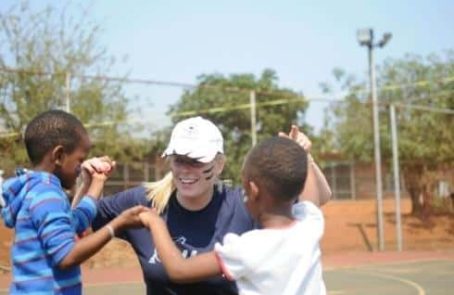A tiny landlocked country in Southern Africa, the Kingdom of Swaziland (also known as eSwatini) combines the many flavors of Africa with rich landscapes in bite-sized form. With tourism still in its infancy, and the first luxury branded hotel only opening in 2018, you will be able to witness the locals authentically maintain their traditions. By volunteering in Africa on a humanitarian trip you will gain a better understanding of life below the poverty line, as well as be able to contribute directly to the people in need. Why Volunteer in Swaziland? The people of the Kingdom of Swaziland are renowned for their friendliness, patriotism to the monarchy and ability to maintain their cultural traditions. The festivals are not done for the tourists, the dancing is not there to impress you and the traditional attire is not worn just so you can ‘learn’ something about the Swazi ancestors: this is them, for real. Swaziland’s numerous environments also means that anything from caving to water rafting and trekking is only a short drive away. High adrenaline activities that will be at your doorstep include zip lining at the Mololotja Nature Reserve, white water rafting down the Usutu River (expect Grade III rapids which can rise to V), caving beneath the Msunduza and Kophola Mountains and walking along a 50m suspension bridge in the Sihlotswane Gorge as part of a canopy tour. GoEco can help to organize some of these special experiences on your volunteer trip as well as offer you the chance of a homestay in a Swazi village. However, over 90% of HIV positive children live in Africa and Swaziland has the highest HIV/AIDS infection rate in the world. Many children are born infected and many more are soon orphaned by parents who have succumbed to HIV/AIDS related complications. Volunteering in Swaziland allows you to make a great impact on those that you encounter as well as certainly on future generations. What to Know About Volunteering in Swaziland Here’s what else you need to know about volunteering in Swaziland: Requirements If you decide to travel with GoEco and volunteer in the Children’s Sports and Play program, then it goes without saying that a good level of physical fitness is necessary. The kids will be running, and so will you! Keeping up with the kids and also setting an example of positive lifestyle choices, will be helping to instill new and good living habits in the younger generations. Safety Swaziland is a peaceful nation with the military never having been involved in foreign conflict. Thus, Swaziland is considered a low risk country to travel to with only the general advice of exercising caution and normal safety precautions during your stay. GoEco will ensure that you have an airport pick up upon arrival and departure, as well as provide you with in-country support and 24-hour emergency support. Language Swazi and English are the official languages, with English being widely spoken due to schools, businesses and the press, being conducted in English. Accommodations You can expect to be living in African comfort with reliable internet, a TV lounge, an outdoor pool, a large deck area and even a luscious garden, all being a part of the lodge where you will be staying during the volunteer program. Sleeping in a dorm room, which accommodates up to six people, you can expect to make friends around the communal barbeque and campfire area and may even have a monkey pop by during your stay. All sleeping materials are provided, however if you plan on taking an overnight tour or delving deeper into the Swatini culture with a homestay, then you should bring a sleeping bag with you. Costs Volunteering in Africa with GoEco means that all of your basic travel needs are included in the program price, such as insurance, airport transfers and meals and accommodation. You should bring some extra cash for doing laundry, souvenirs and for when you want to explore Swaziland on your days off; zip lining anyone? Packing Being located in the Southern Hemisphere, the seasons are opposite to the majority of North America and Europe, with dry winter season starting around mid-April and finishing mid-October and the rainy season following until around March, so make sure you pack appropriately! Malaria and other insect-borne diseases are common, so make sure you pack loose long sleeved clothing and insect repellent. If you expect to be playing with kids, then a good hat and clothes which you don’t mind getting dirty, should be at the top of your packing list! Health GoEco has you covered with comprehensive travel insurance and local in-country support, however you should be prepared with up to date vaccinations (speak to you doctor). Always take the usual precautionary measures when travelling to foreign countries, especially in the African region, such as avoiding ice cubes and only drinking bottled water. Due to Swaziland having a high prevalence of HIV/AIDS, it is vital to be mindful and alert when engaging in activities which may put you at risk of being infected. Where to Volunteer in Swaziland Because of its small size, you will almost never be more than a two hours drive from the nation’s capitals Mbabane and Lobamba, allowing for easy exploration of the country during the weekends. Due to its various terrains including mountains, forests and the savannah, Swaziland is able to house over 500 different bird species, 107 mammal species which are endemic to Swaziland and also the Big Five. Most of the places that you will visit are very small, allowing for a greater chance of catching sight of the animals. Between the Hlane Royal National Park and the Mkhaya Game Reserve, you should be able to tick off most of the wildlife checklist, with smaller parks even allowing tourists to visit on their own without a hired guide. GoEco’s Children’s Sport and Play program allows for volunteers to work with children and become a crucial part of facilitating the growth of the country and of its peoples. Volunteering with children benefits them in all facets of life, including giving them the opportunity for an education that, if not for the volunteers, they may not have had and thus continued to be a statistic in the high unemployment rate. Interactions with volunteers also gives the children access to a greater knowledge about health and may encourage them to develop a sense of awareness about preventative measures that could be taken against a variety of health and lifestyle issues. It also allows them to play and ‘just be children’ in an otherwise harsh world where they may be highly disadvantaged with many responsibilities put upon their young shoulders. During the program you can expect to do anything from coach kids in football, to giving them swimming lessons. You will also share vital life skills such as teeth cleaning as well as join them in song and dance activities.









